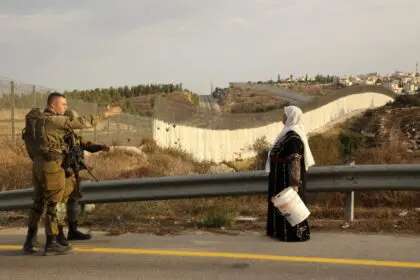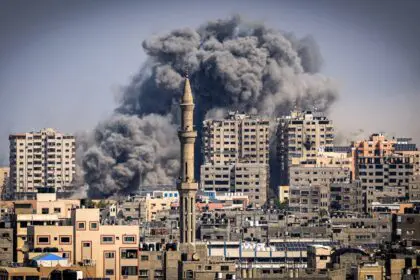Comprehensively covers Israel’s Separation Barrier in the Palestinian-Israeli Conflict, its practice, impact on Palestinian rights, and reports from human rights organisations.

Editorial Note
Israel’s Separation Barrier has gained increasing global attention. This section is part of our Human Rights & International Law coverage within the Palestinian-Israeli Conflict.
Introduction
In 2002, Israel began to build a wall, purported to run along the Green Line or Armistice Line, an international boundary between the West Bank and Israel according to the Armistice Agreements of 1949. Construction began after several terrorist attacks in Israel proper, the barriers’ alleged purpose being to protect the security of the Israeli population.
In practice, the routing of the wall has been found to infringe on the West Bank. According to Btselem as much as 85 percent of the barrier runs through Palestinian territory, thereby de facto annexing more Palestinian territory and infringing the right of Palestinians to self-determination In some cases, it has cut off communities from agricultural land, markets and services and has involved a set of checkpoints that greatly impinge on Palestinians’ daily lives.
Israel’s Separation Barrier
In a report for the UN General Assembly per resolution ES-10/13, the Secretary-General described the separation barrier as a “system of fences, walls, ditches and barriers in the West Bank,” mostly in areas near the Green Line, like Qalqilya, Tulkarm and Jerusalem.
Qalqilya, a town of around 40,000 inhabitants in the Qalqilya governorate, toward the north-east of the West Bank, is one example of an area surrounded by the barrier with one checkpoint for entry in and out of the town, open 12 hours a day. A report by the United Nations Relief and Works Agency for Palestine Refugees in the Near East (UNRWA) in 2003 noted that the complete sealing of the town and restriction of access from everywhere, bar the east, would seriously hinder those living in nearby villages. These residents rely on municipal services in the town, including the UNRWA hospital, used by displaced Palestinian families.
In December 2003, the UN General Assembly sought an advisory from the International Court of Justice (ICJ) on the legal consequences of the wall. Despite objections from Israel, the ICJ delivered an opinion by July 2004, stating the wall restricted the rights of inhabitants, that construction should cease immediately and that the Israeli government should award the impacted Palestinians reparations for damages inflicted on them.
The UN currently keeps a register of damages caused by the construction of the wall.
However, the Israeli Supreme Court has rejected the ICJ’s opinion stating it did not have sufficient or precise facts to make a judgment, as Israel refused to engage. It also brought in the situation of Jewish settlements, which the ICJ weighed in on, as the barrier effectively annexed these illegal settlements built on West Bank land. The Supreme Court said their legality was of no consequence in any decision-making because, in their view, they are part of the local population in need of security, and thus, the Court stated that the barrier was a legitimate measure for self-defence.
While the international community and the Palestinian Authority agree Israel has the right to protect its civilians, they note the wall, in its current manifestation, is disproportionate when balancing the security needs of Israel and the human rights of Palestinians. The infringement of rights in the name of security has been further seen in the Gaza Strip where Israel has been maintaining its illegal siege since 2007 and continues to maintain control over the borders, restricting the movement of Palestinians, including visiting their family in other territories, such as the West Bank.
In 2020, Israel’s refusal to let construction materials and fuel into Gaza caused the territory’s only power plant to shut down, further reducing the electricity supply in the southern enclave. In addition, a full maritime closure and limited entry of goods, food, and medicine only amounted to collective punishment, according to Amnesty International, particularly when COVID-19 infections were increasing. The restriction of Palestinians to enter Israel from Gaza has also been fatal in some cases, as seen with baby Omar Yaghi whose family was denied a permit to attend a scheduled operation in Ramat Gan city.
Human Rights & Palestinian-Israeli Conflict
This article is part of our Human Rights & International Law coverage within the Palestinian-Israeli Conflict.
The Human Rights & International Law dossier on the Palestinian-Israeli Conflict meticulously documents the conflict, covering a wide range of topics, including treaties, human rights violations, policies that contravene international law, and more.




